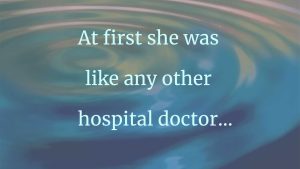Brenda Scearcy
Dr. Robert’s office felt right to me, with a musical birdsong soundtrack, soft lighting and fresh green tea, and I had my best friend in tow: piece of cake. In this serene atmosphere, I was sure that I’d find out what to do next to finish treating my endometrial cancer.
It’s probably gone now, since my hysterectomy two weeks back, I thought. But let’s play it safe; he’s the gynecological-cancer guru.
Like a general gearing up for combat, Dr. Robert said, “We can beat this. We’ll do a second surgery to remove lymph nodes and omentum–robotically, of course, so your recovery time will be quick. Down the road we’ll definitely do radiation and chemo, and your odds of recurrence will go way down.”
That tone. So assured…
“What’s an omentum?” I asked hesitantly.
“A slab of belly fat deep in the abdomen that can trap cancer cells; we usually recommend its removal if the cancer nearby is aggressive.”
“Side effects?” I asked.
“Not much to speak of. In rare cases, you get a slightly draggy foot from nerve damage.”
My whole psyche was dragging its feet. Did I need this, just after coming through a highly successful surgery?
A month before, I’d sought treatment for a garden-variety fibroid. My primary ob/gyn, Dr. Ann, had offered to remove the fibroid laparoscopically. Beforehand, as part of her usual pre-surgical procedure, she sent a tiny chunk to the lab for a cancer check.
Bingo.
A cancerous fibroid is a whole different ballgame, so Dr. Ann and I went to Plan B–a full hysterectomy and ovary removal.
Immediately after the surgery, Dr. Ann cradled my head in her sweet-smelling arm and whispered affirmations to me, cheek to cheek. Although everything else is erased by anesthesia, I clearly remember the feel of her skin and how fervently she whispered, “You’ll even want to eat–salmon!”
I did heal like a champ, wowed by blissful, oxycodone-induced hallucinations and by seeing my teenage daughter mature as she stepped into her new role as pants-puller-upper.
Call me a flake, but I believed that Dr. Ann’s surgery had removed the cancer. During waking hours, I couldn’t drum up any sincere worry. (But I did have nightly “mares,” always the same: a terrifying man breaking into my house, and I a throttled screamer. On a subconscious level, my fears about cancer were in overdrive.)
My first post-op visit with Dr. Ann, a few days after the surgery, was tremendously reassuring. She showed me the lurid photos she’d taken of my cancerous uterine fibroid, backlit and glowing ruby-red, so I’d finally see my torturer. (I still have a wallet-size photo.) We laughed–hard, which I don’t recommend after abdominal surgery.
Then she went over the lab results with me. The cancer was grade one (not aggressive) and had been relatively contained, with just one other spot on one of the removed ovaries. Dr. Ann told me that this spot was a bit of misplaced endometrial tissue that had sprouted a tumor. It was not ovarian cancer, which is often more aggressive. Welcome news. She poured her heart into reassurances.
But still. “There are other treatments, like lymphectomy, chemo or radiation, that I want you to consider,” she said. A recent cancer survivor herself, she wanted to make sure that I stayed in touch with my inner warrior. She sent me to Dr. Robert.
And Dr. Robert insisted that lymphectomy/omentectomy was the least I should do. According to him, chemo and radiation were necessary insurance against the Big C.
He described the omentum as having little purpose and regaled me with stories of women who were vacuuming the house eighteen hours after their surgeries.
I’d studied ecology in grad school; its principles guide every part of my life. I know that everything is interrelated, and that when you do one thing, it can affect other things in surprising ways. But I wanted to believe that the cancer was behind me.
Also, I was foggy-headed, suffering from cold-turkey estrogen withdrawal after the hysterectomy. So my antennae weren’t up, and my energy for fact-checking Dr. Robert’s claims was nonexistent. And then there were those nightmares….
Ultimately, it came down to this: Dr. Ann recommended that I take Dr. Robert’s advice. He was the expert. Hoping that lymphectomy would seal the deal, I had the surgery.
The immediate after-effects:
(1) Excruciating shoulder pain, referred from my diaphragm, from gas injected during surgery.
(2) Lymphedema, a build-up of fluid caused by lymph-vessel blockage. Within two days, I looked like a sumo wrestler, with lymph pooling around my middle. No clothes fit.
(3) A walnut-sized pocket of lymph in my right belly. One night at supper, my shirt suddenly grew wet as lymph spurted out of one of the operation slits.
(4) Permanent nerve damage and numbness: Dr. Robert had accidentally cut nerves to my left quadriceps, groin and lower belly.
Dr. Robert had mentioned none of these possibilities.
During my hospital stay, I never saw him. Once home, I repeatedly phoned his office, begging for help, but he never called back. Two weeks later, during our only post-op visit, he said the nurse had never told him.
Having removed more than half of my abdominal lymph nodes, Dr. Robert found that they were all cancer-free. My post-op report stated that he’d removed them prophylactically; as I saw it, that was like removing a hip so I wouldn’t break it.
A year later, I found my legs and buttocks swelling up again. At first I thought I’d twisted my ankle, but eventually Dr. Ann enlightened me: I had chronic lymphedema.
She steered me to cancer rehab, where I learned I could improve the symptoms slightly with time-consuming exercises, careful skin care and $135-a-pair pantyhose that squeeze me girdle-tight.
Now I roll a tennis ball around my ankle to break apart the fibrosis caused by lymphedema. I research cheaper pantyhose. And to give myself time to exercise and heave my hips into those leg-hugging hose, I set my alarm forty-five minutes early each morning.
I’ve damaged my knee with the grunting maneuvers required to don the hose. Long walks are temporarily a thing of the past.
The last straw is that I must hand wash these tights nightly–an odious eight-step chore.
Looking back, what astounds me is Dr. Robert’s profound lack of curiosity about his interventions’ potential impact on my daily life. He could have anticipated some of the problems–what symptoms might I develop? How ugly would I feel as a human blimp?–and might at least have warned me about what to expect.
And if I’d known the risks beforehand, I could have asked myself which I would choose: uncertainty about a recurrence, or the tedious gamut of lymphedema care?
After this second surgery, friends encouraged me to consult a lawyer about suing. The lawyer explained the difficulties with cases like mine. And I squirmed to think of pictures of my body on a courtroom screen. Frankly, I’m just not the suing type.
In fairness, Dr. Ann affirmed that Dr. Robert’s lymphectomy recommendation was sound. She remained circumspect and uncritical whenever I asked about it. I question only how hard he pushed for it–and how little he said about possible side effects.
I just wanted him to listen. I still wish he would. I fantasize about standing outside his office wearing a sandwich-board sign: “First, do no harm!”
In my perfect world, Dr. Robert would solicit my feedback, listen closely, learn from me and then adjust his methods. Someone else might be spared lymphedema.
And I’d get back my forty-five minutes a day.
About the author:
Brenda teaches and performs traditional Irish music and leads nature hikes for schoolchildren in the ancient forests and wetlands outside of Portland, Oregon, where she and her husband live. “I wrote this story because I felt that my experience would fly under the radar otherwise, and I’d lose the therapeutic benefit of organizing my feelings. I’m certain most doctors and nurses want to know how their interventions impact patients’ daily lives. And I believe most of them will have the joy of identifying with–and being inspired by–Dr. Ann.”
Story editor:
Diane Guernsey







13 thoughts on “Collateral Damage”
I can relate to your story. I was diagnosed with endometrial cancer, grade 1. Radical hysterectomy performed, 19 plus lymph nodes removed. Pathology report found no cancer. I too had lymph fluid flowing out of me and had to wear maxi-pads. Also had fluid ooze from my robotic incisions. Seven weeks later my internal stitches opened and my small bowel prolapsed outside of my body (vaginally). Emergency surgery to repair that. Shortly thereafter the lymphedema started. Doctor said I should be grateful they didn’t find any cancer, she said it must have all been removed when I had my D&C. I’ve been dealing with the lymphedema for four years. It’s life changing. It is so hard to deal with, so expensive too. I try to not let it consume my life, but that isn’t easy to do. I’m hoping to get approved for a lymph node transfer. Insurance has denied it twice. Pretty hard to make advancements in the treatment of lymphedema when insurance companies deny new treatments being offered by doctors!
Brenda, I was horrified to hear on detail what happened to you. You on,y mentioned a little of it to me at camp. I really think that you need to get this in front of Dr. Roberts. I agree with Dr. Trees, these kind of stories need to be required reading for all doctors. Real tories about vaccine injuries to real kids also need to be required reading.
“(4) Permanent nerve damage and numbness: Dr. Robert had accidentally cut nerves to my left quadriceps, groin and lower belly.” That’s not intervention, that’s error.
Sorry this happened to you – Dr. Ann should not have been so sanguine about the aftermath of this destructive surgery. She maybe steering other women his way so it might be worth pursuing some sort of “intervention” of your own.
Brenda, thank you so much for sharing your experience. I am so sorry that you have to live with this chronic lymphedema as a result of that last surgery. I agree with the other commenters that, at a minimum, Dr. Robert ought to read your essay. I’m a surgeon-in-training and felt that this was powerful and important for me to read, so thank you again, and best wishes for your health from here on.
(Regarding one commenter’s statement that when you go to a surgeon, you get surgery: I’d like to put that bad old saying to rest. We are actually taught that the mark of a mature surgeon is knowing when not to operate.)
Dear Brenda,
Your writing captured me from the first phrase and drew me into each successive “chapter” of your experiences. Continue to write!
What to do so that other women do no fall into the trap that you did? Meet with Dr. Ann. What she do differently? Dr. Robert’s lack of informed consent, ignorance of post-op problems and arrogant behavior will not disappear in a meeting. Suing him will. And your suit may settled before going to court. (Will Dr. Robert want photos displayed in court?)
Then, take him before the county medical society and the society of Gynecological-Oncology surgeons.
A caring and experienced plaintiff attorney can get expert opinions, decide about going forward, and guide you through the process.
Brenda, you underwent a radical procedure for a grade 1 cancer. It is time for Dr. Robert to undergo a radical procedure for his breaches in the standard of care.
Latest piece kind of sticks with you. Perhaps it is my age but some days I feel I am surrounded by predators. They can be drugs companies with their endless TV ads for questionable products, or, yes, doctors more interested in the bottom line than in making good medical decisions. My ex-wife, a nurse practioneer, always said when you go to a surgeon you get surgery. So be careful! In this instance, sadly, that is what has happend in spades. Nicely told.
I find the article and comments surprisingly benign under the circumstances. I would be furious. If none of the possibilities of damage you incurred were mentioned, not even in an informed consent document, you should sue, despite not being the suing type. The arrogance!
Great story. I have one with a similar title: http://collateral-damage.net/
Thank you fir writing about your experience. The doctor should have warned you. I hope you send a copy of this to him. I wonder if he would read it or even take it seriously.
I wish Dr. Ann had given you the chance to come back and talk to her before more was done. I wish she had given you the chance to see another surgeon. Something here is sounds wrong. And especially, I worry about this pre-emptive removal of omentum? You’ve made me want to write more about doctor-patient “conversation.” I wish you something wonderful.
And I wish every woman would read what you have written.
Margaret Fleming
Brenda,
Thank you for writing this piece. I do know that people/patients need to heard. I hear you and thank you again.
Thanks you, Brenda for taking the time and energy to articulate this experience. I feel sad that this happened to you.
This kind of experience is not at all unusual, unfortunately. The medical interventions we make are powerful — for the good and the worse.
Educating and empowering patients to be able to make intelligent decisions is one of the most important roles of a doctor.
Your piece should be required reading for doctors in training.
Thank you Brenda and I am sorry that happened to you..I think that a lot of us that have lymphedema probably had it caused to us.. I did not know what it was either..while in the hospital recovering from my mastectomy and lymph nodes removal, I was having my blood pressure done on the arm that my lymph nodes were removed from (3 times a day during my stay)..it was not till I got home from the hospital did I even hear of such a condition and told that you can not have blood pressure, needles to that arm…. it was a few month later I found out I had gotten the condition….